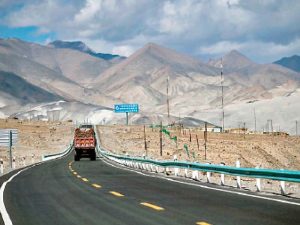BEIJING: Former planning minister Ahsan Iqbal said that the China-Pakistan Economic Corridor (CPEC), which is one of the main projects of China’s Belt and Road Initiative (BRI), has become a major force that is changing people’s lives in both social and economic ways.

The country of Pakistan was having a major energy problem when CPEC began in 2013. In an exclusive interview with China Global Television Network (CGTN), he said, “We were having power outages for 16 to 18 hours a day, and we had major infrastructure bottlenecks with very bad physical infrastructure.”
He also said that there wasn’t enough energy because there wasn’t enough electricity, so industrial and agricultural production was slowing down. This led to more unemployment, which was a big cause of more poverty. Ahsan Iqbal said that the CPEC brought more than $25 billion into Pakistan in three years, which updated infrastructure and built new roads to connect many areas. It added more than 8,000 megawatts of power, which helped the country get through times when it didn’t have enough.
“When we put energy into the economy, our agricultural and industrial outputs went up. This gave thousands of young people more jobs and helped them get out of poverty,” he said.He said that nine special economic zones have been set up in different parts of Pakistan. He also said, “All regions are participating in and benefiting from CPEC, which is another sign that it is a very inclusive project that doesn’t leave anyone behind.”
In these special economic zones, Pakistan and China are working together to set up businesses. This way, the two countries can trade goods with each other and other countries. “The Gwadar Economic Zone is growing very quickly, and nine more economic zones are being built in Pakistan as well. We hope that Chinese investment will help us become more industrialized, which will be a big part of changing the structure of the economy.”
As for improving Pakistan’s exports, he said, “We hope that with Chinese technology and investment and their access to global supply chains, we will be able to improve our exports as well.”
He said that CPEC would change everything for Pakistan and the region and that working together in the region was the key to future economic growth.
“Through regional connectivity, we can make an economic market that will help three billion people in South Asia, China, Central Asia, and the Middle East a lot,” he said. So, he said, programs like CPEC and BRI could help get rid of poverty and unemployment and make the dream of shared wealth and getting to know each other come true. In response to a question about the next step of CPEC, he emphasized the need to keep Pakistan peaceful, stable, and on track with its policies.
“We have a very young population that is now getting education and skills that will be useful in the future economy,” he said. “This makes them a very cheap human resource for investments in the technology and industry sectors in particular.” Ahsan Iqbal said that the government has started a very big plan to stabilize Pakistan’s economy and win back the trust of business people by fully implementing policies that were put in place in 2013.
He said that the Special Investment Facilitation Council (SIFC) brings together all of the government’s departments and branches, whether they are federal, provincial, military, or civilian. This is done to bring in foreign direct investment. He also said, “The SIFC is a brand-new project that the government has started. We hope that it will help bring foreign investors to Pakistan.”
Another question about the amount of debt he had caused got him to say, “If the previous government had pushed CPEC enough, we would have seen a lot of progress in industrial cooperation.” This means that slow work on CPEC actually made the economy slow down. Pakistan’s economy also had trouble because of the very high prices of goods, especially oil and gas. There’s nothing in this mess to do with CPEC or BRI. He also said that this was because most of the investments that came to Pakistan through CPEC were made at very low rates.









































